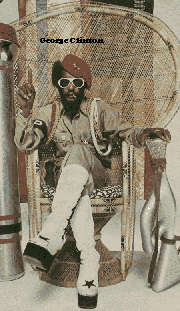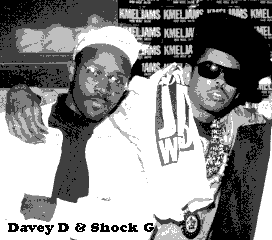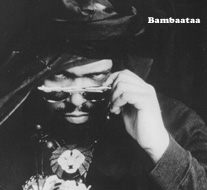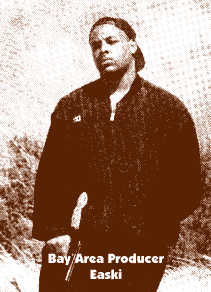Folks may recall how rappers brought artists like
James Brown and
Donald Byrd back into the forefront of Black music during the mid 80s when their music was freely sampled in every which way, shape and form by literally hordes of artists. Back then folks may recall the commonly expressed sentiment that many ascribed too.."
if it wasn't for the rap artists James Brown would be unknown to the younger generation
." And to a large degree there was a lot of truth in that statement, after all, at that time Black radio wasn't aggressively promoting a format in which they would highlight "classic" artists like Brown while maintaining their appeal to younger listeners... The result was many young white listeners being able tell you all about pop icons like the
Beatles and
Elvis while artists like Brown were relatively unknown to the young Black listener, at least until hip hop came along. It"s important to note all this because another facet about hip hop is that it allowed folks and still allows folks to build upon their musical past... The Brown sampling phenomenom in the mid-late 80s was the result of younger people reflecting their musical past. Most of the artist putting out records at this time were from New York and James Brown was not only an artist that mom and dad grooved to, but it was an artist that their older brothers and sisters grooved to in the late 70s when block parties were common place and hip hop was still in its embryo stages...
The break beats that could be found within the grooves of James Brown records were the sounds that really set off these early hip hop jams.
So what does all this have to do with p-funk and its relationship to hip hop? Well one of the great things about hip hop is that it has always been an easily accessible form of expression with each participant being able to bring into the fold their own experiences and musical background So while brothers back east during the late 80s were building off their musical experiences involving James Brown and hip hop culture dating back to the late 70s, brothers out west who were just starting to release hip hop records were bringing a whole other set of musical experiences to the table. Much of it centered around artists like George Clinton, Bootsy Collins George Duke and Roger & Zapp to name a few. Simply put, brothers out west brought p-funk to the hip hop round table. Now upon reading this there are a lot of folks who are immediately gonna reach back into time and point to the p-funk style hip hop music of
EPMD, especially since they dropped the '88 classic tune "You Gots To Chill" which looped the now infamous "More Bounce To The Ounce" beat. Many rap fans consider this jam to be the first record to incorporate a p-funk. sample. In addition, these same rap fans may be quick to point out that cuts like "Knee Deep" and "More Bounce To The Ounce" were staple items in a b-boy's record crates. Back in the days, many a dj cut up these tracks while an emcee flowed. And while it's safe to say that Erik & Parrish earned their spot in the history books with "You Gots To Chill", they weren't the first to utilize music from the p-funk treasure chests... In addition, EPMD's usage didn't reflect the special relation and love the San Francisco / Oakland Bay Area had for funk.
Ricky Vincent better known as the
Uhuru Maggot is a Bay Area music historian who earned his stripes during the 80s for his radio work on
KALX, UC Berkeley's college station... and can now be heard every Friday on
KPFA 94.1 FM... Vincent has not only chronolized funk music through his
History Of Funk radio shows, but he has written his doctorate thesis on the genre..and has now just penned a book for St Martin's Press with an intro from George Clinton himself. This work will undoubtly be a definitive and comprehensive work on this facet of Black music... In a recent interview where Vincent was asked about the Bay Area's love for funk and its relationship to hip hop, he broke things down and explained that there has always been a deep seeded love affair with -funk ..He noted that George Clinton has always claimed there was something 'heavy' about the Bay Area funkateers.. Vincent noted that so involved was that relationship that Clinton recorded part of his live album "P-Funk Earth Tour" right here at the Oakland Coliseum.
This [The Bay Area] was probably the only place that he could capture that strong P-funk vibe If that wasn't enough, Oakland was city where the mothership first landed. This took place in 1976. For those who don't know the mothership was brought back into the forefront when
Dr Dre landed it in his video 'Let Me Ride'. Vincent elaborated by noting that the landing of the mothership was a major turning point. It could be interpreted as the second coming of Christ. And furthermore, Vincent explained that there are many facets of the funk as prescribed by George Clinton that are based upon ancient African religion. It encouraged folks to move in a spiritual direction. In fact many of the songs Clinton performed were nothing more than modern day spirituals that were ripe with metaphors that held religious conotations. For example the song 'Flashlight' was really a gospel song which called upon the Lord to shine some light on the 'funk' [hard times] that Black people here in America were experiencing.
The Bay Area's
Al Eaton, a veteran producer established himself by being
Too Short's early producer. In addition Al had a hand in the production end back in the days for such well known Bay Area acts like
Dangerous Dame,
Rappin' 4 Tay and
E-40 &
The Click who were than just starting out their careers. Eaton expounded upon Vincent"s assessment by noting that while p-funk had a strong hold in the Bay Area it wasn't the only funk kickin' up dirt. "It wasn"t just p-funk, but it was the whole musician scene that put the Bay Area on the map, " Eaton noted. Groups like
Tower Of Power,
Cold Blood,
Maze going all the way back to
Sly Stone in the late 60s all had big names and helped shape the Bay Area music scene.
"There"s always been a funk thing going on in the Bay Area-It's always been funk base central. There's always been lots of musicians on the crest, who didn"t make it to the big time but yet had names around town." , Eaton pointed out. Funk bands like
Johnny Talbert and the Thangs,
2 Things In One and
Marvin Holmes and
The Uptights were some of the funk bands that immediately came to mind.
Eaton pointed to several factors that may influenced the Bay Area to embrace the funk. First off, many of the musicians who played for these bands back in the late 60s now have kids who are now into hip hop. He also made it known that when he was coming up there was at least 2-3 bands on every block. "Each one was trying to get to the next level and hence it made for a very competitive situaution.", he noted.
Eaton's last reason for the Bay Area's embrace of funk focused on a famous movie entitled
The Mack. "It seems like the all Bay Area rappers at one point or another were influenced by The Mack. " , Eaton said. The movie depicted lots of characters- real life players and pimps who many Bay Area artist have directly or indirectly tried to emulate try to emulate. Eaton went on to add that phrases like 'Player's Club' and 'Pimp Of The Year' which were borrowed by SF rapper
Rappin' 4 Tay and Oakland artist
Dru Down reflected the raw gritty attitude street vibe often associated with funk. "Funk is here because its always been here", Eaton concluded, "And there's been a lot of musicians laying down the groundwork for years".
Eaton made mention of Sly Stone and spoke about how important he was in developing the funk scene here in the Bay Area... Vincent took it a step further by noting that artists like George Clinton were influenced by Stone who once upon a time ruled the city of Vallejo back in the late 60s-home of funky Bay Area artists like E-40,
Potna Deuce,
Khayree,
Young Lay,
Mac Dre and
Mac Mall to name a few..Vincent gave Sly props for being the first musician to come out and dress in freaked out ostentatious outfits. This of course was later picked up and mimicked by Clinton and his p-funk mob.."Sly managed to package all the energy of James Brown while embracing the hippie vibe which was pervasive because of the summer of love among other things taking place about that time".
When speaking on the subject of funk and hip hop Bay Area style, no discussion would be complete without talking about the work of
Shock G lead rapper and producer for
Digital Underground. In late 1987 several months before EPMD hit with their track "You Got's To Chill" Digital Underground made a lot of noise with a hard hittin' song entitled 'Underwater Rimes'. Here Shock incorporated sampled riffs from the Parliament classic 'Aquaboogie' and cleverly weaved all sorts of p-funk like characters and elements into the song, including
MC Blowfish. For the most folks it was hard to believe Clinton himself didn't have a hand in the production. Eventually Clinton did come aboard and lend a helpin hand in Digital's second lp 'Sons Of The P'. It was on this lp that Shock felt DU was a head of its time because of their liberal use of the moog synthesizer.. Nowadays artists like
Snoop Dogg and
Ice Cube have been on hit with songs that utilize this device to provide that buzzin' bassline...
Shock G pointed that funk was heavy all around the country except New York where he spent a lot of time growing up. He went on to explain that there were two things going on in New York City.."First of all, disco had taken off in a big way and hip hop was starting to become big among the younger people. The result of this activity was that New York missed out on the P-funk".
Shock explained that he made a deliberate attempt to bridge the gap between hip hop and p-funk. He noted that while a lot of his buddies in New York were true to the game with respect to hip hop however, they constantly fronted on George Clinton. Shock's exposure to funk came when he moved down to Florida to stay with his dad. Folks in his house and school were fanatical about p-funk. He began fusing hip hop with George's music out of necessity. "We would try and play some NY based underground break beats like 'Love Is The Message' or 'Dance To The Drummer's Beat' and it they would scare folks off the dance floor." He eventually won them over when he started cutting up p-funk songs...As Shock became engrossed with p-funk he found himself heading out west to the Bay Area because he had heard the vibe for p-funk was not only strong but supportive of the style of music he was trying to create. "One of the reasons I decided to move I to Oakland was because Oakland was putting p-funk on way back...and the vibe was strong..plus it was the only place in the country where they had a radio show dedicated to the funk". Shock of course was referring to the
Uhuru Maggot's 'History Of Funk Show'.. Eventually Digital's first singles were dropped on the Uhuru Maggots Show . The first hip hop based show in which Shock dropped DU material was mine on the same station...
KALX.
An interesting aspect that Shock brought to light was the fact that he felt that George Clinton was heavy on the Black side with both his concepts and lyrics... "George's music was unselfish and promoted brotherhood... It reminded people of Black festivities and celebrations". Shock also noted that George was very conscious and all about the upliftment of Black people. Originally Digital started off the same way.. In fact their original name was
Spice Regime and they were attempting to experiment and become the Black Panthers of hip hop complete with barets and all that. Two things happened that forced DU to switch..One was the emergence of
Public Enemy and their baret wearing S1Ws. The second was the overwhelming popularity of Humpty Dance and the character 'Humpty Hump' which force the group to momentarily move away from the conceptual p-funk style vibe that eventually emerged on their second lp 'Sons Of The P'.





